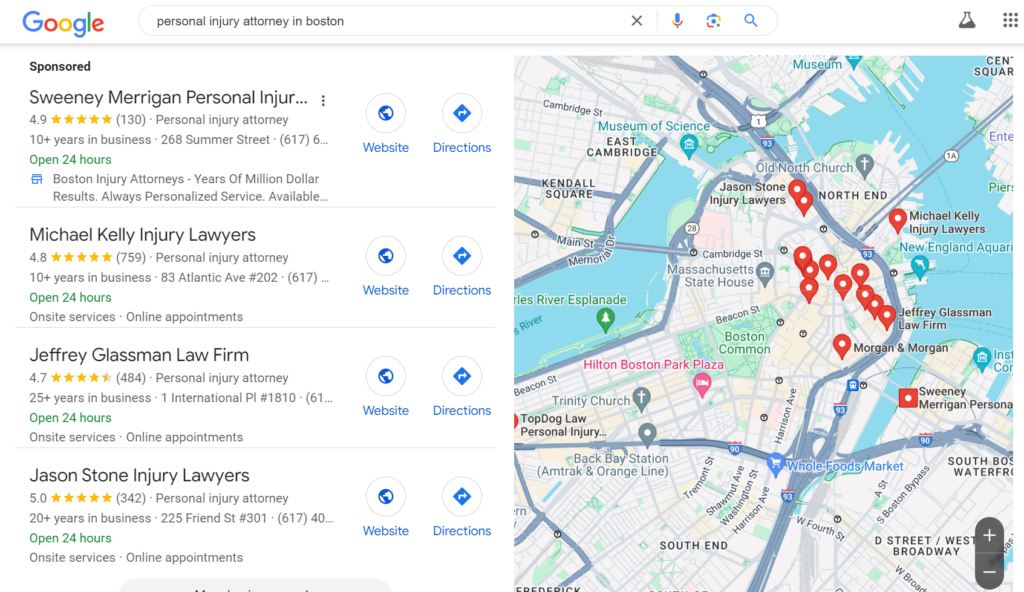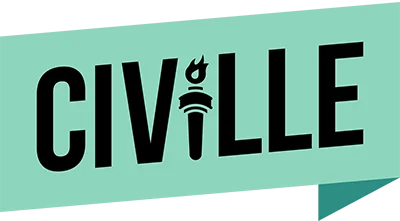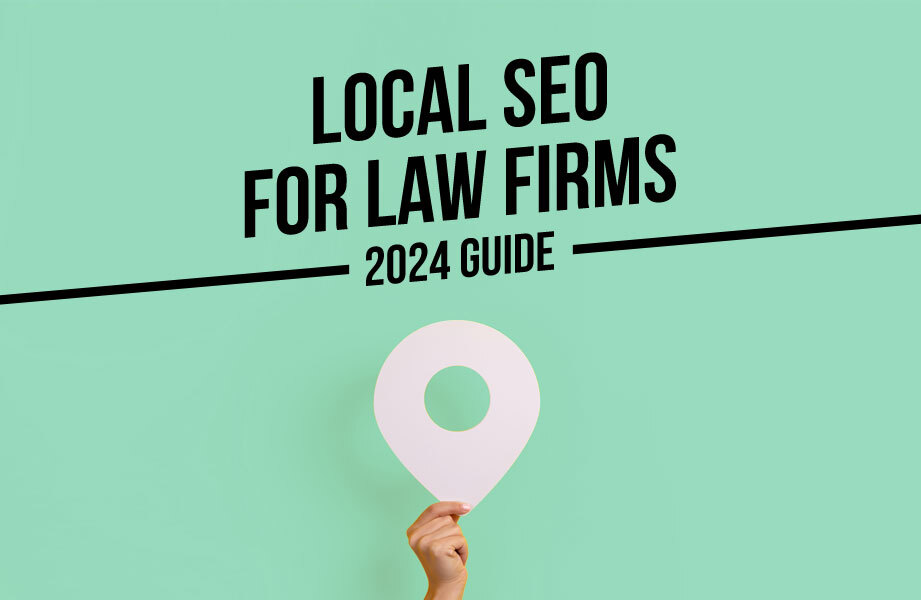
Boston, a city renowned for its rich history, academic institutions, and thriving tech scene, also boasts a highly competitive legal market. In today’s digital age, a strong online presence is crucial for law firms to attract clients and establish themselves as leaders in their field. To navigate the complex landscape of Boston SEO, law firms must understand the unique challenges and opportunities presented by the city’s digital ecosystem.
In this post, we’ll delve into the intricacies of Boston SEO for law firms, exploring key strategies and best practices to help your firm rank higher in search engine results and reach your target audience. As with any marketing strategy, you have to put in the time and effort to get results in SEO. You don’t necessarily have to spend the most to stand out as a law firm in Boston, but you do have to do the work – which is a very Boston trait.
SEO Competition in Boston: A Closer Look
Boston’s legal market, while smaller than other major cities, is equally competitive, with numerous talented attorneys vying for a limited pool of clients. To stand out in this crowded field, law firms must have a deep understanding of local SEO trends and Bostonian audience behavior. Here are some key factors to consider:
Local Search Focus: Boston’s compact size makes local search even more crucial. When residents seek legal advice, they often search for attorneys in their specific neighborhoods or nearby towns. Incorporate relevant keywords like “Boston divorce lawyer” or “Cambridge personal injury attorney” to target these local searches.

Multilingual Considerations: Boston’s diverse population, including a significant immigrant community, makes multilingual SEO a valuable strategy. If your firm caters to specific demographics, consider creating content and optimizing for keywords in their preferred languages.
Industry Specialization: Given the competitive nature of Boston’s legal market, specialization is essential. Focusing your SEO efforts on specific areas of practice, such as intellectual property law or healthcare law, can help you attract clients with relevant legal needs.
Keeping Up with Trends: The legal landscape is constantly evolving, and so should your SEO strategy. Stay informed about emerging legal trends in Boston and adjust your keyword research and content accordingly. Analyzing your competitors’ SEO strategies can also provide valuable insights.
By understanding these competitive nuances, you can develop an effective SEO campaign to help your Boston law firm attract more clients and establish itself as a leader in its field.
Need a New SEO Plan? Book With Us Today
The First Building Block: Technical SEO
Technical SEO involves optimizing your website’s backend structure and coding to ensure search engines can crawl, index, and understand your content effectively. Here are some essential technical SEO elements to consider for your Boston law firm:
Website Speed and Performance
- Page Load Time: Aim for a page load time of 3 seconds or less. Slow-loading websites can negatively impact user experience and search engine rankings.
- Mobile Optimization: Ensure your website is fully responsive and displays correctly on all devices, including smartphones and tablets. Google prioritizes mobile-friendly websites in their search results.
- Image Optimization: Compress images without sacrificing quality to reduce file size and improve page load speed. Use descriptive file names and alt text to enhance image accessibility.
Mobile-First Indexing
- Google’s mobile-first indexing means that Google primarily uses the mobile version of your website to index and rank it. Ensure your mobile site is optimized for search engines and provides a great user experience.
URL Structure
- Clean and Descriptive URLs: Use clear and concise URLs that include relevant keywords. Avoid long, complicated URLs with unnecessary parameters.
- Consistent Structure: Maintain a consistent URL structure throughout your website to help search engines understand your site’s hierarchy.
XML Sitemap
- Create an XML sitemap: This file provides a roadmap of your website, helping search engines discover and index your pages efficiently.
- Submit your sitemap to Google Search Console: This will help Google index your site more quickly.
HTTPS Security
- Implement HTTPS: Use HTTPS (Hypertext Transfer Protocol Secure) to encrypt your website’s data and protect sensitive information. Google prioritizes websites that use HTTPS.

Structured Data
- Use structured data: This markup language helps search engines understand the content on your website, such as your firm’s address, contact information, and attorney profiles.
- Schema.org: Utilize Schema.org vocabulary to create rich snippets and enhance your website’s visibility in search results.
Duplicate Content
- Avoid duplicate content: This can confuse search engines and negatively impact your rankings. Use canonical tags to indicate the preferred version of a page.
Core Web Vitals
- Optimize for Core Web Vitals: These metrics measure the user experience on your website, including page load speed, interactivity, and visual stability. Google uses Core Web Vitals as a ranking factor.
Civille’s Approach: Technical SEO can be confusing. But, it cannot be ignored. Civille believes that a law firm’s website lays the foundation for every other element of digital marketing after that. For this reason, the team has developed the industry’s tightest SEO platform, with top page speed scores according to Google’s own pagespeed insights test, and all the proper markup from schema and original content. Once this important groundwork is in place, the rest of the ongoing strategy can commence.
Law Firm Website Design and SEO
In addition to the technical SEO vitals, a well-designed website not only enhances user experience but also plays a crucial role in SEO. Here’s how website design can impact your search engine rankings:
User Experience (UX)
- Intuitive Navigation: A clear and easy-to-navigate website helps users find the information they need quickly, which can improve your website’s bounce rate and time on site.
- Mobile-Friendliness: As mentioned earlier, Google prioritizes mobile-friendly websites. Ensure your website is responsive and provides a seamless experience on all devices.
- Fast Loading Times: A fast-loading website improves user satisfaction and can lead to higher search engine rankings.
- Clear and Concise Content: Use clear and concise language that is easy to understand. Avoid jargon and technical terms that may confuse your audience.
Visual Appeal
- Professional Design: A visually appealing website creates a positive first impression and can help build trust with your audience.
- High-Quality Images: Use high-quality images that are relevant to your content and optimized for search engines.
- Consistent Branding: Maintain a consistent brand identity throughout your website, including colors, fonts, and imagery.
Accessibility
- Accessibility Features: Ensure your website is accessible to people with disabilities by following accessibility guidelines like WCAG (Web Content Accessibility Guidelines).
- Alt Text for Images: Use descriptive alt text for all images to help visually impaired users understand the content.
- Keyboard Navigation: Make sure your website can be navigated using a keyboard, as this is essential for users with disabilities.
READ MORE: The 100 Best Law Firm Websites of 2024
Civille’s Approach: The design of a law firm website should be very personal for the law firm, but we also want to make sure that it is optimized for conversion. The team at Civille utilizes the data we have gathered over the years to make meaningful decisions when it comes to user experience in relation to SEO.
Website Page Speed and SEO for Boston Law Firms
Page speed is a critical factor in SEO, as it directly impacts user experience and search engine rankings. For Boston law firms, a fast-loading website can lead to several benefits:
- Improved User Experience: Users are more likely to stay on a website that loads quickly. A slow-loading website can frustrate visitors and lead to a high bounce rate, which can negatively impact your search engine rankings.
- Higher Conversion Rates: Faster websites can lead to higher conversion rates, as visitors are more likely to take action (e.g., contact your firm) when they have a positive user experience.
- Better Search Engine Rankings: Google and other search engines prioritize websites with fast loading times. A slow-loading website may be penalized in search results, while a fast-loading website may receive a boost.
How to Improve Page Speed
- Optimize Images: Compress images without sacrificing quality to reduce file size and improve page load speed. Use tools like TinyPNG or ImageOptim to compress images.
- Minify CSS and JavaScript: Minify your CSS and JavaScript files to remove unnecessary characters and reduce file size.
- Leverage Browser Caching: Enable browser caching to store static assets (e.g., images, CSS, JavaScript) locally, reducing the need to download them from the server each time a user visits your website.
- Use a Content Delivery Network (CDN): A CDN can help deliver your website’s content faster to users located in different regions.
- Reduce Server Response Time: Optimize your server configuration and hosting environment to improve server response times.
- Minimize HTTP Requests: Reduce the number of HTTP requests your website makes to load content.
- Choose a Lightweight Theme: Use a lightweight theme for your website to minimize the amount of code that needs to be loaded.
Civille’s Approach: Civille has developed a mobile-first approach to the website platform, meeting potential clients where they are – on their mobile devices. Civille websites load extremely quickly on your phone, helping ensure you don’t miss a crucial case where someone needs assistance from a law firm immediately.
Local SEO in Boston
Local SEO plays a vital role in helping Boston law firms attract clients from their local community. A well-optimized Google Business Profile is a cornerstone of local SEO strategy.
Google Business Profile Optimization

- Claim and Verify Your Business: Ensure your law firm is listed on Google Maps and claim your Google Business Profile. Verify your business to gain access to all features and insights.
- Complete Your Profile: Provide accurate and detailed information about your firm, including name, address, phone number, website, hours of operation, and services offered.
- Optimize Keywords: Use relevant keywords in your business name, description, and category to improve your visibility in local search results.
- Encourage Reviews: Encourage satisfied clients to leave positive reviews on your Google Business Profile. Reviews can significantly impact your
- local search ranking.
- Respond to Reviews: Respond to all reviews, both positive and negative, in a timely and professional manner. This shows that you value customer feedback.
- Add High-Quality Photos: Include high-quality photos of your law firm, attorneys, and office space. Visuals can help your business stand out in search results.
- Post Regularly: Share updates about your firm, such as blog posts, events, or new services, through your Google Business Profile. This keeps your profile active and engaging.
- Track Analytics: Use Google Analytics to track the performance of your Google Business Profile and identify areas for improvement.
Other Local SEO Strategies
- Local Citations: Build citations for your law firm on local directories and websites. This helps search engines understand your business’s location and credibility.
- NAP Consistency: Ensure your Name, Address, and Phone number (NAP) are consistent across all online listings. Inconsistent NAP information can confuse search engines and negatively impact your local rankings.
- Local Content: Create content that is relevant to your local community, such as blog posts about local legal news or events. This can help your website rank higher in local search results.
- Geo-Targeting: Use geo-targeting to target your SEO efforts to specific areas within Boston. This can help you reach potential clients in your desired neighborhoods or districts.
Civille’s Approach: Optimizing a law firm’s Google Business Profile – and making sure it continues to rise and maintain maps results rankings – is one of the bread and butter strategies that Civille employs. Check out our Google Business Profile Guidebook for more helpful pointers.
FREE DOWNLOAD – How to Optimize Your Law Firm’s GBP
Unique Opportunities for Boston Law Firms
Boston, as a historic and innovative city, offers several unique SEO opportunities that can help law firms stand out in the competitive legal market.
- Leverage Boston-Specific Keywords: Incorporate Boston-specific keywords into your website content, including local landmarks, neighborhoods, and events. This can help your firm rank higher in local search results.
- Target Boston-Based Publications: Reach out to Boston-based publications, such as local newspapers, magazines, and online news outlets, to contribute articles or expert opinions on legal topics. This can increase your firm’s visibility and establish you as a thought leader in the Boston legal community.
- Partner with Local Organizations: Collaborate with local organizations, such as chambers of commerce, business associations, and community groups, to network with potential clients and build your firm’s reputation.
- Optimize for Boston-Specific Events: Target SEO efforts around major Boston events, such as the Boston Marathon, First Night, or the Head of the Charles Regatta. This can attract visitors and potential clients searching for legal services related to these events.
- Utilize Boston-Specific Social Media Groups: Participate in local social media groups and forums to connect with potential clients and build relationships within the Boston community.
Making the Right Choice for Your Boston Law Firm
SEO is a crucial element of a successful law firm marketing strategy in Boston. By understanding the competitive landscape, implementing technical SEO best practices, optimizing website design and speed, focusing on local SEO, and exploring unique opportunities, you can increase your online visibility, attract potential clients, and build a thriving practice.
Remember, SEO is an ongoing process that requires continuous monitoring and optimization. Stay up-to-date with the latest SEO trends and algorithm changes to maintain a competitive edge in the dynamic Boston legal market.





